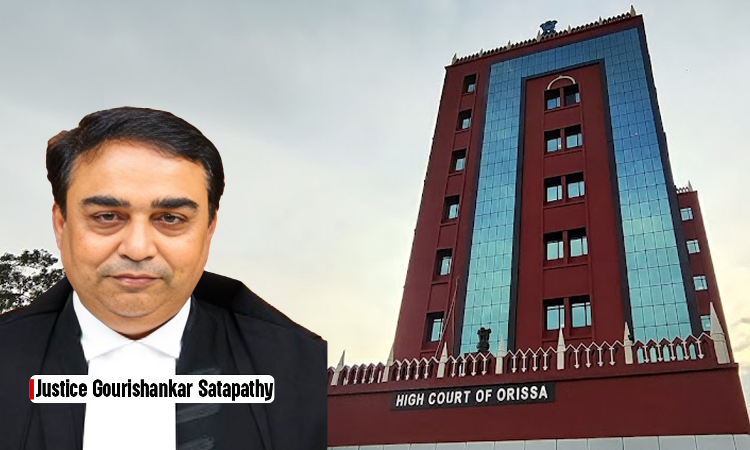- Home
- /
- High Courts
- /
- Orissa High Court
- /
- Orissa High Court Waives Bail...
Orissa High Court Waives Bail Condition Stipulating One Surety To Be Relative Of Accused, Calls It 'Onerous'
LIVELAW NEWS NETWORK
9 Sept 2025 2:30 PM IST
The Orissa High Court has waived a bail condition imposed by a Sessions Court requiring the accused to furnish two sureties, one of whom must be his 'kin/relative', on the ground that putting such 'onerous' condition defeats the purpose of bail.A single bench of Justice Gourishankar Satapathy also held that putting such conditions which are impossible to comply is against the intention of...
The Orissa High Court has waived a bail condition imposed by a Sessions Court requiring the accused to furnish two sureties, one of whom must be his 'kin/relative', on the ground that putting such 'onerous' condition defeats the purpose of bail.
A single bench of Justice Gourishankar Satapathy also held that putting such conditions which are impossible to comply is against the intention of the legislature. It also observed –
“After granting bail, imposing excessive and onerous conditions, which are impossible for compliance by the accused for his release from custody is not the spirit of law and would be considered depriving the accused of his personal liberty without the sanction of law.”
The petitioner filed this miscellaneous application under Section 483(1)(a)/(b) of the Bharatiya Nagarik Suraksha Sanhita (BNSS) challenging a peculiar condition imposed by the Sessions Judge-cum-Special Judge, Kalahandi whereby he asked the accused-petitioner to furnish two solvent sureties, one of whom must be his relative/kin.
It was argued on behalf of the petitioner that such condition is 'onerous' and difficult to be complied with and for such reason, the petitioner could not be released from custody even after grant of bail.
The Court took a serious note of such unusual impediment imposed by the Sessions Court which curtailed the liberty of the petitioner. Finding fault with the impugned condition, Justice Satapathy held –
“It appears that the learned Sessions Judge while granting bail to the accused has imposed a condition on the petitioner to furnish a surety, who must be his kin relative, but it appears that such condition is not only onerous, but also the same was an impediment for the petitioner for getting out of the jail. Right to personal liberty is the constitutional mandate, but detaining a person in custody is an exception and that must be in according to the procedure established by law.”
The Judge underlined that the purpose of imposing conditions for bail is to ensure attendance of the accused and surely, not to curtail his liberty. Therefore, when the condition of furnishing two sureties was already imposed, there was no need to insist for a surety who is essentially a relative of the accused. Further, even if such condition was imposed, the Court said, it should have been waived when the accused was unable to comply the same.
“While interpreting the provision of law, the Court should always be inclined to give effect to the personal liberty of a person. The underlying principle in imposing conditions while grating bail is that the excessive bail is no bail.”
The Court also said that imposing “not only excessive but also impossible” condition is against the intention of the law-makers and even a violation of Article 21.
“…while granting bail by passing an order, it is presumed that the Court has already intended to exercise its discretion of personal liberty in favour of the accused, but thereafter imposing an impossible condition to comply would only frustrate the intention of the Court to grant bail to the accused and it is against the personal liberty of the accused which is guaranteed under Article 21 of the Constitution of India.”
Reliance was placed on the guidelines issued by the Supreme Court in In Re Policy Strategy for Grant of Bail, 2023 LiveLaw (SC) 76 wherein it directed that in case an accused/convict fails to get released due to insistence upon local surety, the Courts may abstain from imposing such condition. The same thing was reiterated in Ramchandra Thangappan Aachari v. The State of Maharashtra, 2024 LiveLaw (SC) 715.
Moreover, the Bench also borrowed credence from Satender Kumar Antil v. CBI & Anr., 2022 LiveLaw (SC) 577 wherein the Apex Court discouraged Courts from imposing 'impossible bail conditions' which are hard to comply.
Thus, while keeping the rest of the order intact, the Court waived the impugned bail condition by observing –
“In the aforesaid situation and circumstance and taking into account the precedents referred to above, this Court considers it proper to allow the CRLMA by waiving out the condition of furnishing a surety of kin relative of the petitioner, especially when the petitioner is unable to get out of the jail despite being allowed to go on bail.”
Case Title: Harsha C v. State of Orissa
Case No: CRLMA No. 107 of 2025
Date of Judgment: September 03, 2025
Counsel for the Petitioner: Mr. Dhananjaya Mund, Advocate
Counsel for the State: Mr. C. Mohanty, Addl. Public Prosecutor
Citation: 2025 LiveLaw (Ori) 116



